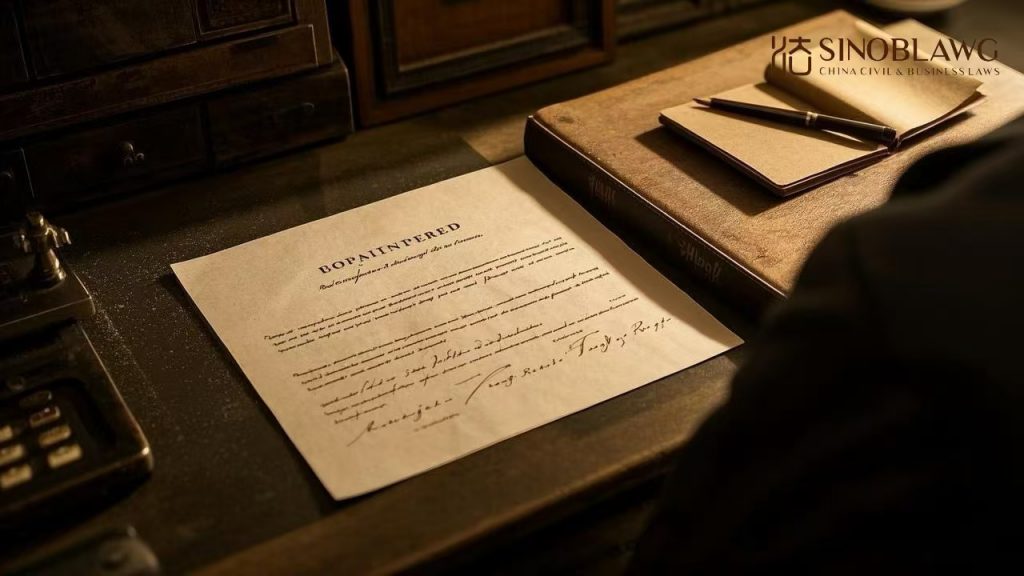[NOTE, THE INFORMATION IN THIS POST IS NO LONGER VALID AFTER CHINA ENACTED ITS CIVIL CODE. SEE A NEW POST ON FORMS OF WILLS IN CHINA]
The number of foreigners with some kinds of properties or assets in China has been sky-rocketing every year for the reasons that (1) more and more foreigners come to China for luck of fortune, and equally (2) more and more Chinese citizens emigrate and convert into foreigners. Naturally, foreign-related legal affairs have been increasing exponentially, among which is the inheritance issue.
As a way of leaving assets or properties to offspring or to beloved ones, a will is often adopted. So it is important for foreign testators to understand the legal requirements on making a will which disposes of properties located in China.
Besides the general requirements that the will-maker has the mental capacity to make the will, and that the terms of the will do not go against laws, there are formal requirements that shall be closedly heeded in order to make a valid will in China.
I the Requirements in Forms of a Will
As learned from Wikipedia, many countries and states have stringent rules governing what kinds of will shall be held valid. China is no exception. In China Succession Law, there are types of wills:
(1) notarial will. A will that is made by testator through a notary public agency.
Notarizing a will-making is highly recommended in China, as the law has made it expressly clear that a notarial will shall prevail over any other types of wills in the case of any inconsistency between multiple wills. In other words, a person shall only be able to amend or alter a notarial will by making a new notarial will which shall explicitly repeals the former one(s).
(2) holographic will or hand-written will. Such a testator-written will shall be duly signed and dated by the testator. There is no requirement on witness presence.
With personal computers widely used in our life, as a result, more and more people have relied on computers to draft a will and get the will printed and then sign and date the printed will. However, this has given rise to debate as to the validity of such printed wills. Given modern methods of forging electronic materials, it is reasonable to call into question the validity of a will that is not entirely written by testator’s own hands. Though it will be equally unreasonable to rule out the use of personal computers in making a will, we recommend that testators make their wills entirely in handwriting and do not resort to personal computers for the making.
(3) Will written by another on behalf of the testator. Such a will shall be made with more than two witnesses in presence and one of the witnesses shall be the one that writes the will. The will so made shall be duly dated with specific year, month and date, and shall be signed by the writer, other witness(es) and the testator.
As to who can serve as witness in making such a will, China Succession Law and China Supreme Court interpretation have made it clear that the following persons shall not act as witnesses: the heirs, other persons bequeathed in the will, and their (of the heirs and such other persons aforementioned) creditors, debtors and business partners, as well as people with no or limited legal capacity.
(4) sound-recorded will. China Succession Law allows a person to make its will in the form of sound-recording but there must be more than two witnesses in presence.
(5) A testator may, in an emergency situation, make a nuncupative will, which shall be witnessed by two or more witnesses. When the situation is over and if the testator is able to make a will in writing or in the form of a sound-recording, the nuncupative will he has made shall be invalidated.
II Disposing of Properties in Your Will
Though generally speaking, laws do not intervene the disposition and distribution by the testator of their own assets in a will, there are limits. And there are some heeds testators shall take in order to achieve your desired result of their wills.
(1) A testator must reserve or set aside necessary assets for his or her heir/successor who cannot labor or does not have a source of income. This means that even though the testator leaves in his or her will nothing to an heir who is out of her or his favor, the court will order that certain portion of the estate shall be reserved for maintaining such heir in need.
Whether an heir cannot work or does not have a source of income shall be determined at the time of the effectiveness of the will, the time of death of the testator.
(2) Reservation shall also be made for unborn child upon spliting the estates. In case the baby is stillborn, the share so reserved shall be dealt with in accordance with rules governing the statutory succession, or the descent and distribution rules. In case the baby dies after birth, the reserved share shall be inherited by his or her heirs.
(3) A testator may impose or attach certain obligations on the heirs or legatees to qualify their inheritance. If the heir or legatee, without cause, fails to perform such obligations, he or she may be deprived by court of their right to inherit the estate concerned.
(4) Sometimes, a testator may wish to bequeath certain assets to one particular heir, intending this heir to gain full ownership to such assets. This desired result can only be attained by specifying explicitly that such assets shall be bequeathed to that person only. Without such explicit wording, such assets may turn out to be owned by another unintended person, generally the spouse of the intended heir. This is because that China Marriage Law has adopted the community property rule for marital properties of a couple. This law has provided that as a general principle, the assets or properties acquired by one spouse by way of gifting or inheritance in the course of their marriage shall be automatically deemed as community property, unless the gift or the will has made it clear that the assets or properties in question are intended only for one person.
III Transfer of Inheritance Rights
To inherit estates located in China may seem to be a difficult job. Very often, one of the heirs may wish to save the trouble by “transfering” or “assigning” his or her share in the estates to other heirs. However, strictly speaking, it is void and null to “transfer” an heir’s share in the estates under Chinese laws. In other words, agreement concluded by the heirs for transfering share in estates will not be recognized in China. Notary public office will not help to notarize such agreement, rendering it impossible to legally make the intended transfer.
So how to achieve that purpose?
While transfer of shares in estates is not allowable, heirs may “relinquish” their shares to other heirs. Relinquishing shall be made in clear and express manners. In practice, it is recommended that relinquishing be made in writing to other heirs. By relinquishing, the heir may “quit” the inheriting process taking place in China. Of course, the relinquishing heir may separately have agreement with other heirs in respect of consideration for the relinquishing.
But it shall be carefully noted that under Chinese inheritance laws, the legal consequence of relinquishing is that the relinquished share(s) will be equally divided and distributed by all remaining heirs equally. If the relinquishing heir intends to give his or her share to a nominated heir (not all other heirs), an agreement shall be entered into among all heirs to ensure that other heirs may not challenge or dispute the intended transfer.
Lastly, but probably the most importantly, the above discourse on will is based on the assumption that Chinese inheritance laws are applicable to the will. But according to Chinese newly enacted laws on choice of law regarding foreign-related civil matters, inheritance under a will, unlike statutory inheritance/succession, may be governed by other laws that can be the laws of the place of testator’s regular residence or laws of testator’s nationality, at the time of the making of the will or death of the testator.







Hi,
under Chinese law, is there any specific provision governing resealing of grant? My Malaysian friend has properties in China. When a grant of representation is granted, resealing can be done to be given the same force, effect as though it is granted in that foreign country.
hi Joey, no, there is no such a thing “resealing” which is very common among common-law jurisdictions. The estate administrator will have to resort to local help to get the estates in China duly processed. In some cases, where trusts are invovled, you will have to get things done as if there was no will and no trusts. For more detailed discussion, please write emails to me. We can even talk over Zoom meeting or WeChat if you have an account. Cheers!
It shall be noted that the information in this old post is no longer valid as China has reformed its inheritance laws in China Civil Code.
Here in addition to the contents of the post, with regard to making a will for a foreigner’s assets (would-be estates) in China, it can be a tricky issue. Many foreigners or even foreign lawyers would think the best way to make the will is to have a China lawyer to draft the will and even notarize the will in China notary office.
As indicated at the end of the post above, if the testator or will-maker does not live in China or has no habitual residence in China not is he or she Chinese, then the appropriate way to go about making the will is to have it made by a foreigner lawyer at the place of client’s habitual residence or in the country of his or her nationality.
A recent inquiry from a Singaporean law firm reminded me to make this point clearer to visitors to my blog and I hope people won’t be misled.
Hello Jason Tian
I want to ask you. Can my friend that lives in china put me as a foreigner that lives in the united states on his will to receive property
Thank you very much.
yes, sure. Just make sure that you are clearly and definitely stipulated in will. Also, for you as a non statutory heir, it is important for you to declare your willingness to accept the estate within two months after you know or ought to know the start of the inheritance, namely, the death of the deceased. If possible, get the will-maker to appoint someone as executor in the will who will take care of your interests by informing you of the death immediately.
Thank you so much to take time out of your day to respond
Hello
A Malaysian friend who has properties and Banks accounts in China wishes to write a will for his wife and children who are Chinese. They also have properties and Bank accounts in Malaysia as well. It is understood that he also must have a will in China too. Currently he has a will in Malaysia and wishes to re write his will. Before he proceed to write the will in Malaysia again, he wants to do one in China. What will you advise and how about your company assist him to write a will in China Shanghai, without affecting or revoking his will in Malaysi. Kindly revert with your contacts, as my friend will be back to Shanghai in July. Please provide mobile contact, email and address where he can meet up with you personally. Thank you
and my Name is Lee Chin Hee, i am professional life and estate Planner
who will be the successors and how to divide and distribute?
Hi Xilu, I guess I need to know the specific facts in your case to give answers to your questions. Legally, there are ready answers at laws for your general questions of this kind. Jason
Hi,
Under Chinese law, who is the executor or administrator of an estate if a person dies without a will?
Can you please refer me to a piece of legislation or law, or does this just come from the common law or tradition?
Thank you.
Unfortunately, in China, though the concept of “will executor” does once appear once in the law, there are no other legislations that further touches or elaborates the concept. So basically, the concept of executor or administrator of estate plays no meaningful role in the course of inheritance at all.
In practice, in the absence of a valid will, all the successors shall work together to divide and distribute the estate left by the deceased.